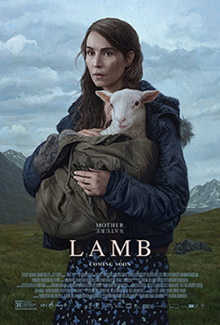Most people who talk about this Icelandic film try to be vague on what it’s about, judging that its twist is too central to fully enjoying it. That makes it impossible to really delve into any discussion about it however so consider this a spoiler warning. Lamb is part horror film part folk tale and I love that the audience inevitably tries to imagine all kinds of outlandish explanations to explain what we see, yet the truth, such as it were, is straightforward and literal. This may not be scary per se but it is very disquieting to watch and that means it’s good.
Maria and Ingvar are farmers who work a remote patch of land in Iceland, growing crops and keeping a herd of sheep. While delivering the foal of their pregnant sheep, they are shocked to see that one of the babies is a strange hybrid with the head of a sheep but a mostly human body. The couple instantly takes to the baby and raise her as if she were their own child. They name her Ada and bring her into their home, letting her sleep in a crib exactly as if she were human. The sheep mother becomes a nuisance, constantly trying to get at Ada to retrieve her. Maria eventually takes a gun and shoots the sheep dead. Ada is unable to speak but proves to be intelligent as she is able to understand human speech. When Ingvar’s brother Pétur, who seems to always have money troubles, arrives to visit unannounced, he is shocked to see Ada and dismayed that the couple are treating her as if she were human.
Between the minimalistic dialogue and how the couple tacitly accept Ada into their lives without trying to find out more about her origins, I think it’s natural to wonder if this is some kind of weird surrealist illusion or if Ada is exerting some kind of supernatural influence on their minds. That’s why I quite like that every turn, the film emphasizes the physical and biological reality of Ada. She eats, she bathes, her sheep hand has a harder time holding on to objects than her human hand and so on. The quotidian work at the farm is mundane as well, repairing the tractor, cleaning the barn, sowing crops. I note that the farm’s location does look almost too good to be true with spectacular vistas of the mountainside. This is a beautiful film and also one that is earthy, rooted in ordinary rural life. It is simply asking us to accept that the existence of this sheep-human hybrid too is part of that reality.
Thematically, it is possible to read this film in a few ways. Superficially it could be about the bonds of parental love. More specifically it made me think of the so-called stolen generation of different countries when mainly white colonialists would steal the children of the natives to raise as their own. At one point, I wondered if it were a critique against people who raise pets as if they were children, which is how my wife and me live ourselves. Ada is unambiguously sapient however so raising her as an intelligent child is clearly the moral to thing. The real conflict then is only in forcibly stealing her from her parents. The film throws in some obfuscation however as there are no scenes of the couple taking care of their herd of sheep after they have Ada. There is some potential in having her realize that she is different from her parents but the thread isn’t fully explored. I dislike the digression of Pétur who keeps making advances on Maria and isn’t fully called out on it. It feels thematically irrelevant and the character seems useful only to cement that Ada’s presence is literal and not metaphorical.
I’d still rate this as a successful horror film as it is very disturbing to watch. Having a character who behaves as a human child in all respects and is even cute yet has the head of a lamb, cinematically portrayed in full realism and not in some cartoonish style, does evoke in me at least a kind primal revulsion. I can fully sympathize with Pétur’s initial reaction to seeing his brother and sister-in-law treating Ada as a human child. The film is very beautiful too of course but I feel that this is somewhat of a detriment as the farm at times feels a little too idyllic and gorgeous to be quite real. This seems to be director Valdimar Jóhannsson debut and overall I’d say it’s a respectable success.
